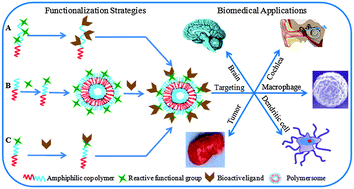Polymersomes are latest entry to the drug carrier systems and have proven their utility to deliver therapeutic agents to specific tissues/organs due to their versatile polymeric architectures and self-assembly of polymeric chains into vesicular containers of therapeutic agents. Recent research has focused on the development of multi-functional polymersomes as targeted drug delivery systems for combined therapeutic applications and theranostic applications where therapeutic delivery via passive or active targeting can be simultaneously combined with diagnostic capabilities. Functionalized polymersomes have been prepared by (a) conjugation of functional ligands to preformed polymeric vesicles, (b) self-assembly of end-group functionalized block copolymers, or (c) use of polymers with functionalized hydrophilic blocks. This review focuses on various strategies used for developing functionalized polymersomes, as a means to achieve multiple goals of therapy as well as diagnosis by use of specific ligands, while maintaining their ability to encapsulate and deliver desired therapeutic or diagnostic principles. Various ligands used for such functionalization have been discussed with a focus on cellular/tissue targeting as well as other biomedical applications of the same.
